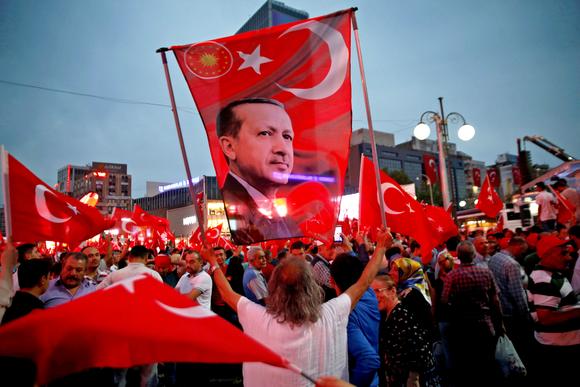Suspects in Turkey can now be detained for as long as 30 days without charge and the government can listen in on all conversations they have with their lawyers under a new presidential decree, according to the Resmi Gazette, an official government publication.
It is the first measure implemented under new powers granted to President Recep Tayyip Erdogan by a three-month state of emergency declaration issued Thursday.
It is expected to be ratified by parliament, where Erdogan’s AKP party holds the majority.
Before the July 15 coup attempt, Turkey’s detention period without charges was 24 hours, extendable to as many as four days.
The government also shut down more than 2,000 institutions linked to the cleric Fethullah Gulen, Edogan’s longtime rival who has been in self-imposed exile in Pennsylvania since 1999. Erdogan accuses Gulen of being behind the coup attempt and has requested his extradition from the United States. Gulen and his supporters accuse Erdogan of using the state of emergency “to solidify his power and persecute his critics.”
Erdogan accuses Gulen of being behind the coup attempt and has requested his extradition from the United States. Gulen and his supporters accuse Erdogan of using the state of emergency “to solidify his power and persecute his critics.”
Turkish authorities detained Gulen’s top aide Saturday, according to a source from the Turkish president’s office. Halis Hanci was taken into custody in the town of Arakli in northern Turkey. He entered Turkey two days before the military coup attempt last week, the source said.
Turkey fired or suspended 50,000 people this week from the country’s institutions and security forces. They included judges, teachers, police and journalists.
More than 9,000 soldiers have been arrested since the coup. Government officials said 1,200 were released Saturday.
Turkey’s secular Republican People’s Party, CHP, has planned a rally for Sunday. The party opposed the coup attempt and supported Erdogan, but it voted against his state of emergency declaration.
Friday, CHP organizers invited Erdogan’s AKP supporters to the rally and they agreed.
The secularists have said their denouncement of the coup does not mean carte blanche for the measures the government will try to enact in the failed coup’s wake.
Both sides have agreed that the national flag and flags bearing the image of Turkey’s founding father, Ataturk, would be the only symbols on display at the rally, which could mark a rare show of solidarity for a country that has failed to stand together in the aftermath of several terrorist attacks this year.
The government’s response to the rally will also widely be seen as a test of its commitment to democratic freedoms.































